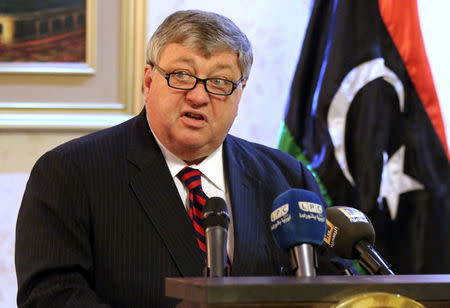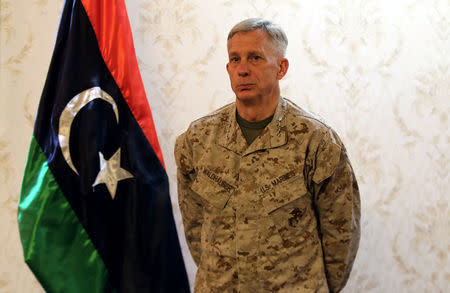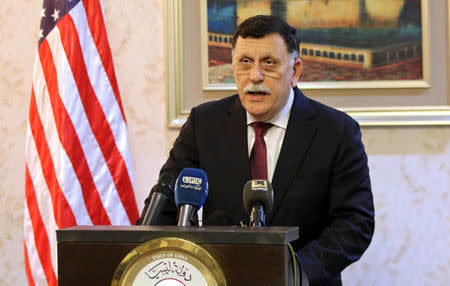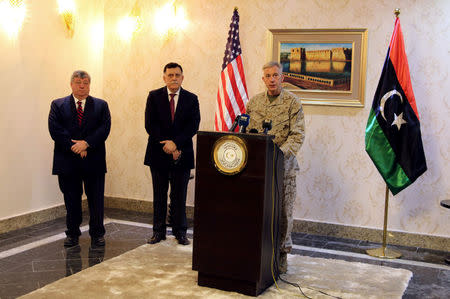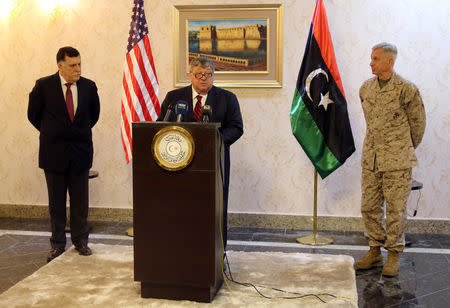U.S. envoy endorses Libya's U.N.-backed government in whirlwind visit to Tripoli
By Aidan Lewis TRIPOLI (Reuters) - The U.S. ambassador to Libya pledged Washington's support for its U.N.-backed government on Tuesday and urged rival factions to avoid civil war, during the first, fleeting visit to the country by a U.S. envoy in nearly three years. Peter Bodde, who is based in Tunis, and Marine General Thomas Waldhauser, the top U.S. military commander overseeing troops in Africa, flew into Tripoli for two hours to meet the prime minister of Libya's Government of National Accord (GNA) and other senior officials. There has been uncertainty over U.S. policy on Libya following Donald Trump's election as president in November. Trump said in April he did not see a role for the United States in Libya apart from defeating Islamic State. "The visit today demonstrates the continued commitment of the United States to the Government of National Accord and to political reconciliation in Libya," Bodde told reporters. The GNA has struggled to function since arriving in Tripoli in March last year, failing to resolve deep-rooted security and economic crises in western and southern Libya. Factions that control a parliament in eastern Libya have rejected it, as has the military commander they are aligned with, Khalifa Haftar. GNA Prime Minister Fayez Seraj recently met Haftar in Abu Dhabi, but it is unclear whether their discussions can lead to a reset of the U.N.-mediated deal under which the GNA was created. Tensions have risen since Thursday, when a force under the GNA's command attacked a southern air base, killing dozens of Haftar's men. "We call on all Libyans to avoid further conflict that could lead to a civil war and would enable terrorism and increased social and economic hardships," said Bodde. "We applaud the ongoing Libyan dialogue on how to form a government that has broad acceptance across Libya." He said he welcomed Libyan efforts to hold elections next year. A quartet of European, Arab and African states also threw their weight behind U.N.-led peace efforts on Tuesday at a meeting in Brussels, where the U.N. envoy said the air base attack had shown there was a political "vacuum" in Libya. ARMS EMBARGO Bodde paid tribute to GNA-aligned forces that defeated Islamic State in their North African stronghold of Sirte last year, and to progress against Islamist extremists in Benghazi, where Haftar's forces have been fighting for three years. "We are working closely with Libya to expand its counter-terrorism capacity and stand ready to help Libya train professional armed forces as we strengthen cooperation on our shared regional security goals," he said. Seraj, who met Trump briefly on the sidelines of a summit in Riyadh on Sunday, said his government would submit a request to the United Nations this week to lift its arms embargo on Libya. A U.S. State Department official said the international community continued to encourage Libya to provide briefs that would "enable consideration of exemptions" to the embargo. The United States evacuated its embassy staff from Tripoli in June 2014 during an escalation of militia violence that left Libya with rival governments, one in the capital and one in the east. Along with other Western diplomatic missions, the U.S. staff have since been based in neighbouring Tunisia. The Italian and Turkish embassies in Tripoli reopened earlier this year. Envoys from other countries pay regular visits. Security in Libya is especially sensitive for the United States because of the Sept. 11, 2012, attack on the U.S. mission in Benghazi in which militants killed Ambassador Chris Stevens and three other Americans. Bodde and Waldhauser met Seraj at Tripoli's Mitiga airport. Tripoli's main airport was destroyed in fighting in 2014. (Editing by Hugh Lawson and Richard Chang)

 Yahoo News
Yahoo News 